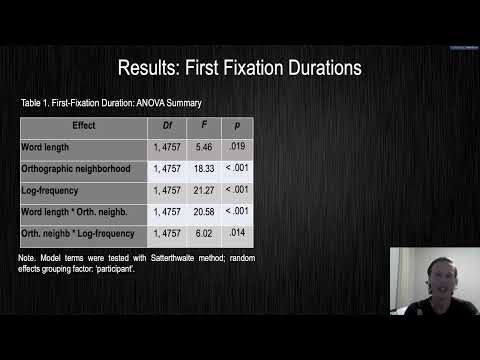 Speaker: Danil Fokin @Danil_Fokin
Speaker: Danil Fokin @Danil_Fokin
 Affiliation: University of Warsaw
Affiliation: University of Warsaw
Title: Reading Russian Poetry: An expert-novice study
Abstract (long version below): Investigating the role of expertise in poetry reading, we recorded eye movements of native Russian poets (10) and non-poets (10) while they read modern Russian poetry. We aimed to determine whether expert knowledge contributes to the development of genre-appropriate reading strategies. Controlling for lexical and text variables, we analyzed early (first fixation duration, first-path gaze duration) and late (total reading time) stages of text processing using a mixed-effects regression model. Thus, poets’ Gaze Duration remains steady as they progressed through verses and lines, demonstrating expertise-modulated reading behavior. In contrast, novices exhibited typical reading patterns, accelerating as they progressed through poems.

 Long abstract
Long abstract
Investigating the role of expertise in poetry reading, we assumed that poets’ professional knowledge contributes to the emergence of poetry-appropriate reading and comprehension strategies, manifested in different reading patterns. We invited to participate in the study professional Russian native speaker poets, i. e. experts (10) and non-poets, i. e. novices (10). Experts reported reading poetry daily while novices mentioned reading poetry less than once a month. Currently, there is a lack of empirical studies on poetry in the Russian language, which is underrepresented in the field of experimental poetics. Furthermore, there is a lack of research involving readers who are professionally engaged in poetry writing, literary criticism, and poetry competitions. By addressing these gaps, we can gain a better understanding of the differences between these two groups and identify where these differences lie. Thus, the findings of the research will provide insights into expertise-dependent patterns of poetry reading from the perspective of poetry creators rather than solely from the poetry lovers’ angle.
We used eye tracker to record eye movements of two groups of readers as they read modern Russian poetry. We analyzed the following indices: First Fixation Duration as an index of early stages of word processing, First-path Gaze Duration as a later and more controlled measure of word comprehension, and Total Reading Time as the most general index of word processing. We employed linear mixed-effects regression to examine reading times per word, controlling lexical- (word length and frequency and lexical neighbourhood) and text variables (word position in a line and in a text). More complex measures, e. g. regressions and skipping rate, couldn’t be examined due to the lack of necessary data to build a more complex model.
Supporting previous findings, we established that first fixation durations reflected lexical variables exclusively, while total reading time was affected by lexical and text variables. The level of expertise had not any impact on these indices. Only the first-pass gaze duration was additionally modulated by poets’ expert knowledge. Experts were less sensitive to the word length and retained a steady pace of first-pass reading throughout the poems and within verse lines. This confirmed our assumption that professional knowledge and regular reading of poetry contribute to the poetry-appropriate reading strategies and comprehension. In contrast, novices became faster as they progressed through the poems and showed differences between line-final and non-final words. The total reading time increased as both groups progressed through the poems. This anomaly could be revealed by the increasing the experimental sample or by the precise and detailed analyses of more complex indices of late processing such as regressions, words skipped, or second- and third-pass gaze duration.
Taken together, we concluded that expertise in poetry modulates the way participants read poetic texts and facilitates navigation within the poem and comprehension processes. It might reflect that poets tend to read poetry unbiased, perceiving all words as equally significant. Furthermore, the novices’ increase of the reading pace towards to the end of the line might mirror the traditional poetry reading strategies, e. g. rhyme expectations and rhyme sensitivity, whereas poets, being familiar with free verses and unrhymed poetry, do not demonstrate such patterns and exhibit less sensitivity to rhymes. Our results support common theories of empirical literary studies that prior experience with literary texts contributes to the emergence of distinct processing modes. Additionally, the findings reflect the literary studies view on modern poetry, suggesting the equivalence of the lines and words within the contemporary poetic texts, which can affect the reading behaviour of the professional poets.

